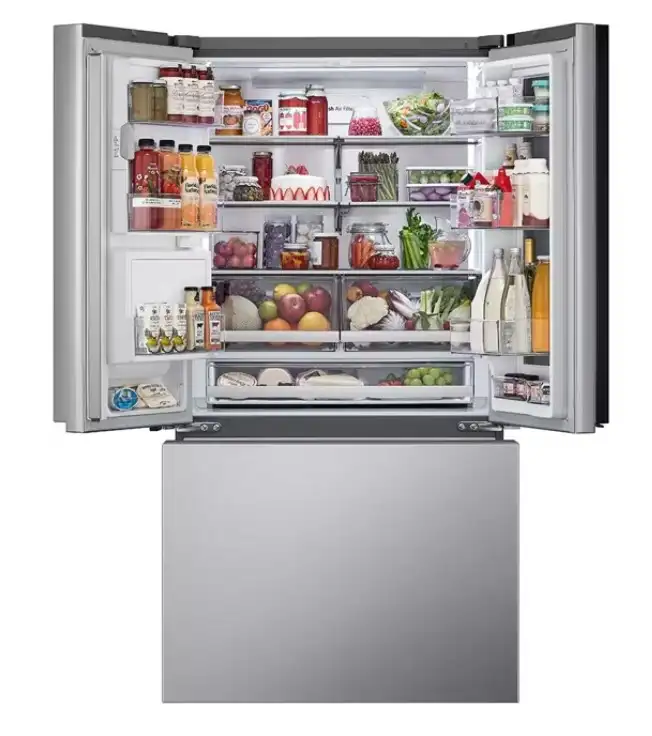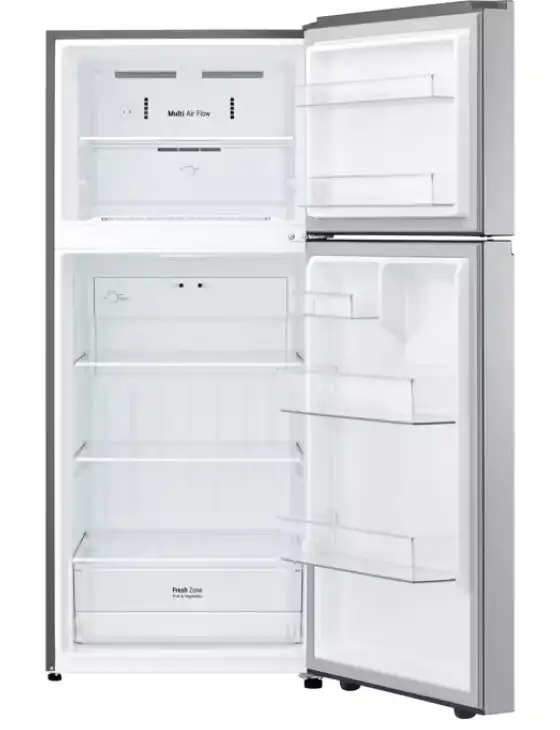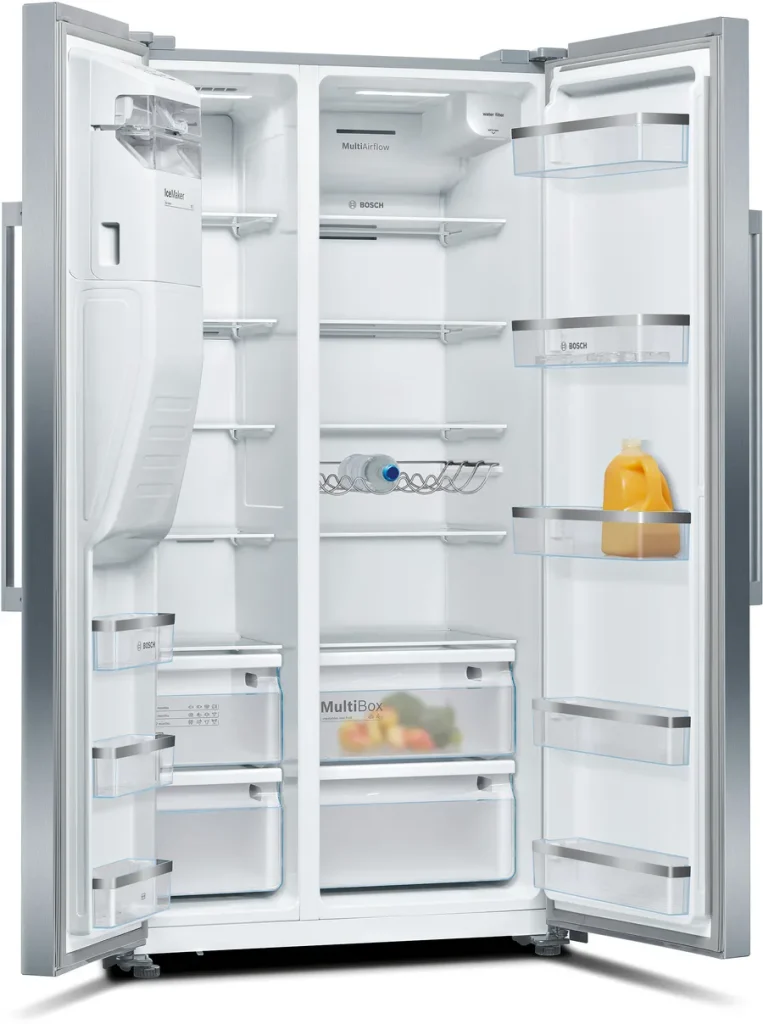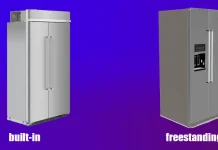While there are numerous refrigerator models and styles, the fundamental differences often boil down to the placement and number of compartments. The core design elements—such as where the fridge and freezer are located—remain consistent across most models. The rest often comes down to additional features and design tweaks, like extra compressors, dispensers, or smart technology.
Differences between refrigerators
Refrigerators vary in several key aspects, each influencing their performance and usability:
- Location and Door/Drawer Configuration: One of the most noticeable differences is the number and positioning of doors or drawers, as well as the location of the freezer compartment. These design choices play a significant role in how convenient and accessible the refrigerator is for daily use, making them a primary differentiator for many consumers.
- Compressor Type: There are two main types of compressors used in refrigerators:
- Standard Compressors: These operate at a constant speed, turning on and off as needed to maintain the desired temperature.
- Inverter Compressors: They are more energy efficient as they adjust the rotational speed according to cooling demand, providing more stable operation.
- Refrigeration System: The technology behind how the refrigerator cools is another factor:
- Refrigerant Compression Refrigeration (Compressor Refrigerators): The most common and widely used system today.
- Thermocouple Refrigerators: An outdated system, rarely produced anymore, relying on thermoelectric cooling.
- Smart Refrigerators: These modern refrigerators come with built-in operating systems and smart technology, allowing for remote control, automated settings, and integration with other smart home devices.
- Additional Features: Some refrigerators offer extra conveniences, such as:
- Water Coolers: Built-in dispensers for cold water.
- Ice Makers: automatic ice maker.
These factors collectively help you decide which refrigerator will best suit your needs based on functionality, efficiency, and modern features.
Types of refrigerators from different manufacturers
Despite the differences I have described, manufacturers themselves choose how to categorize their refrigerators into types. To give you an example, I have chosen a few manufacturers and made a table showing how they position their refrigerators.
| Brand | Refrigerator Types |
|---|---|
| Samsung | – BESPOKE – 4-Door Flex™ – 3-Door French Door – French Door – 4-Door French Door – Side-by-Side – Top Freezer – Specialty and Kimchi |
| LG | – Bottom Freezer – French Door – Kimchi & Specialty Refrigerator – Side-by-Side – Top Freezer |
| Kenmore | – French Door Refrigerators – Side-by-Side Refrigerators – Bottom Freezer Refrigerators – Top Freezer Refrigerators – Compact Refrigerators |
| Frigidaire | – French Door Refrigerators – Side-by-Side Refrigerators – Single Door Refrigerators – Top Freezer – Compact Refrigerators – Wine & Beverage Refrigerators |
| GE | – Top Freezer Refrigerators – French Door Refrigerators – Side-by-Side Refrigerators – Bottom Freezer Refrigerators – Small & Undercounter Refrigerators |
| Midea | – Multi-door Refrigerator – Top Mounted Refrigerator – Bottom Mounted Refrigerator – Chest Freezer |
| Siemens | – Built-in Fridges and Freezers – Freestanding Fridges and Freezers – Wine Coolers |
| Bosch | – French Door – American Style – Freezers – Wine Fridges – Built-in XL Fridge-Freezers |
| Hisense | – American Side-by-Side Refrigerators – Combi Refrigerators – Cross Door Refrigerators – French Door Refrigerators – Single Door Refrigerators – Undercounter Refrigerators |
French Door multi-door refrigerators
A unique feature of French door refrigerators is that by opening the two large doors of the refrigerator compartment, you have access to a spacious, large storage area with no internal partitions. The freezer compartment is located at the bottom and comes in a variety of configurations, such as with drawers or a door. This design has led to a variety of variations, including the 3-door French door refrigerator and the 4-door French door refrigerator.
Refrigerators with top or bottom freezer compartment
These are classic refrigerators with two main compartments: a refrigeration compartment and a freezer compartment. Initially, the freezer was placed at the top, allowing the heavier cold air to naturally flow down into the refrigerator compartment through ducts. However, since the freezer is used less frequently than the fridge, a new design was introduced where the freezer was moved to the bottom, and cold air is now circulated upward with the help of a fan. Today, the placement of the freezer compartment is largely based on consumer preferences, which vary by region.
Side-by-Side Refrigerators (American Refrigerators)
In the United States, the concept of side-by-side refrigerators was introduced, featuring a vertical division between two compartments: one for freezing and the other for refrigeration. This design offers greater convenience by allowing both frozen and fresh items to be stored at eye level or within easy reach, depending on user preference. The side-by-side layout provides versatile storage options and easy access to both compartments.
Specialty Refrigerators
Beyond standard household models, there are specialty refrigerators designed for unique needs or to store specific types of food. For instance, in Korea, it’s common to have a separate refrigerator specifically for storing kimchi, the country’s traditional fermented vegetable dish. Compact refrigerators are also available for use in hotel rooms, mobile homes, or other small spaces. Additionally, there are refrigerators specifically designed for storing wine, ensuring that bottles are kept at the ideal temperature and humidity levels. These specialty models cater to various requirements, making them ideal for specific environments or purposes.










[…] The range of manufactured refrigerators – manufacturers who produce good refrigerators are not limited to one type of refrigerators produced. Their range of refrigerators includes all types of refrigerators. On the types of refrigerators can be found in the article “What are refrigerators, a brief overview.” […]